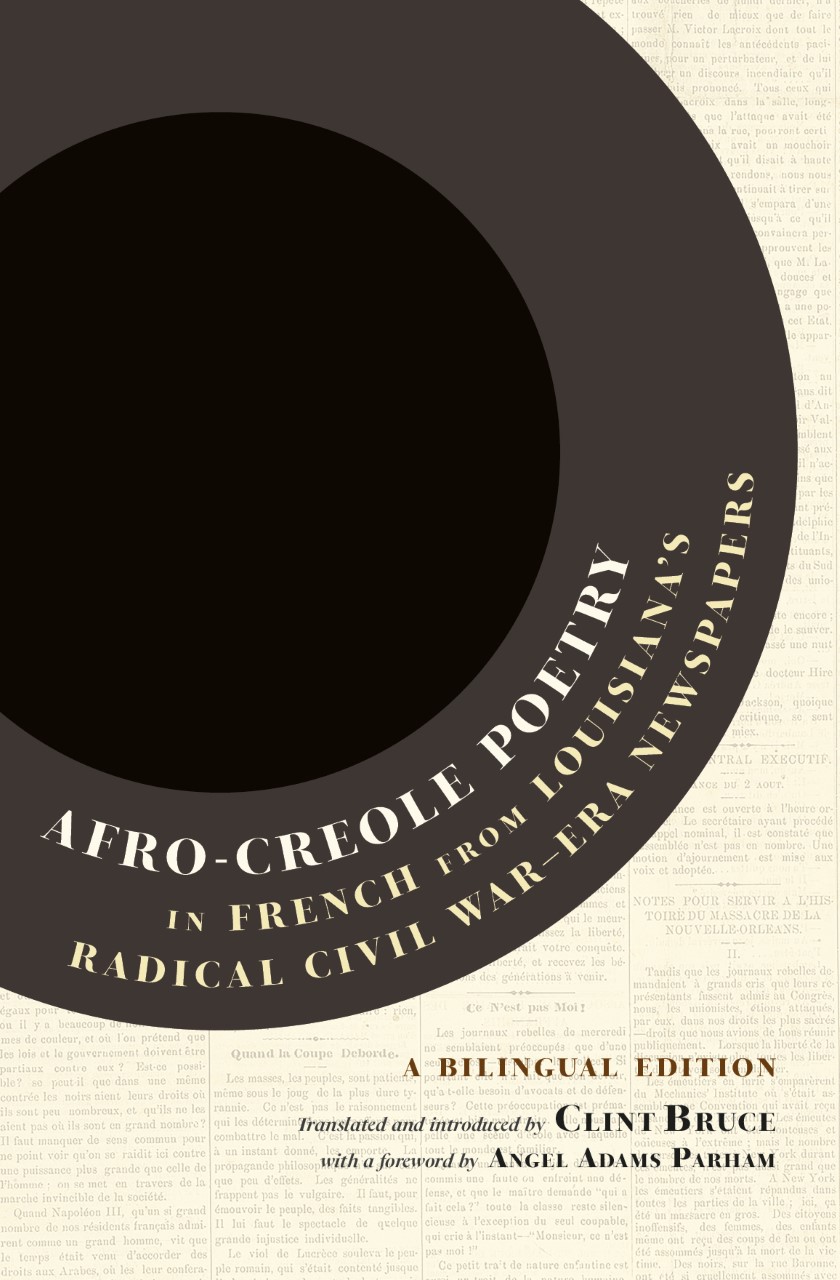
Afro-Creole Poetry in French from Louisiana’s Radical Civil War–Era Newspapers
A Bilingual Edition
The Historic New Orleans Collection 2020 • hardcover
7.5" x 11" • 384 pp.
20 black-and-white images
ISBN 978-0-917860-79-9
$40 • £40
For instructors’ exam copies, visit www.upress.virginia.edu/content/exam-copy-request-form.
New Videos: New Orleans poets craft 21st-century responses to 19th-century poems. Watch the latest videos and join a conversation in verse!
Awards and honors
- Winner of the 2021 Lois Roth Award, recognizing outstanding efforts in translation by the Modern Language Association
- Winner of a 2021 Vindie Award by the Southeastern Independent Booksellers Alliance
- Longlist selection for the National Translation Award in Poetry, American Literary Translators Association
- Honorable Mention: Leadership in History Awards, American Association for State and Local History
- Honorable Mention: American Alliance of Museums Competition, Publication Design
Description
“At a time when Black Americans continue to fight for and defend their civil and political rights, and when the specter of white supremacy casts an ever larger shadow over the painstaking gains of the last 50 years, it is more important than ever to remember and learn from the cultural engagement and political legacy of New Orleans’s Afro-Creoles.”
—Angel Adams Parham, from the volume’s introduction
Collected and translated in full for the first time, 79 original works by over a dozen activist authors resurrect powerful voices from the foundational era of the civil rights struggle—which began not in the 1950s and ’60s but in 1860s New Orleans, in French. Two Afro-Creole newspapers take center stage: L’Union and La Tribune de la Nouvelle-Orléans, founded during the Civil War by New Orleans’s influential community of French-speaking free people of color.
The original French poems appear alongside Clint Bruce’s sensitive English translations. A comprehensive and accessible introduction, biographies of the poets, and thorough annotations immerse readers in Civil War and Reconstruction-era Louisiana.
New evidence of a poetic hoax debuts in the volume, along with recently discovered issues of La Tribune that report on the 1866 Mechanics’ Institute massacre in New Orleans, in which protestors marching for Black suffrage were attacked by white mobs that included firemen and police.
Praise
“[A] book of tremendous historical value. Its substantial introduction draws the reader into the story of the newspapers. . . . The translations strive to show the formal mastery of the originals, underlining the sophistication of the writers. . . . Every reader will learn important things from this book: it restores a wrongly forgotten but now-inspiring chapter in Francophone poetic creativity and US history.”
—American Literary Translators Association
“In translations of poems gleaned from two storied Afro-Creole newspapers, Bruce uncovers coded artistic exchanges revealing key social networks. His accessible study is a masterful guidepost to a sophisticated civil rights movement. The volume’s biographical notes on known authors and textual annotations are not to be missed. Bruce’s exhaustive research also yielded the startling discovery of La Tribune issues long thought to be lost. The recovered copies reveal the newspaper’s frontline reporting of the 1866 massacre at the Mechanics’ Institute.”
—Caryn Cossé Bell, author of Revolution, Romanticism, and the Afro-Creole Protest Tradition in Louisiana, 1718–1868
“A most important book that gives voice to poets whose enormous contributions are not yet sufficiently recognized. The volume’s introduction is an excellent book in itself, and the high-quality English translations are a joy to read. A rare book whose impact will only increase over time.”
—Gwendolyn Midlo Hall, author of Africans in Colonial Louisiana: The Development of Afro-Creole Culture in the Eighteenth Century
“Un récit fascinant, radical et important tout comme la poésie qui l’a inspiré. Une anthologie intelligente et affranchie d’interprétations simplistes, convenues où l’expérience afro-créole reprend corps et transforme notre manière de penser l’histoire du monde francophone de l’Atlantique.”
—Georgette LeBlanc, former poet laureate of the Canadian Parliament and author of Le Grand feu
“In a beautifully produced volume with documents and archival images from the era, Bruce has made this poetry accessible and legible to a general public. With a short but comprehensive introduction, indispensable biographical notes on the poets, and a careful thematic arrangement, this Afro-Creole poetry resonates across a century and a half to remind us of the political power and moral value of art.”
—Shirley E. Thompson, author of Exiles at Home: The Struggle to Become American in Creole New Orleans
“Afro-Creole Poetry in French from Louisiana’s Radical Civil War–Era Newspapers brings to light much that has been missed in the evolving struggles of Black America, which for centuries has had to overcome internal cultural divisions to unite in the battle for freedom and civil rights. Throughout the Civil War era and into Reconstruction and beyond, these Black Creole authors embraced fraternité and égalité to articulate the crushing injustice of enslavement. Their messages, hopes, and cause, delivered in elegant verse, laid a foundation for future Black literature and radical thought worldwide. This collection not only serves as a significant missing cultural and political link to and among Black Creole authors, it also enables their truth to resonate today, when misdeeds are honored and virtue is dismissed. Thank you, Clint Bruce, for your tireless research, for your graceful translations, and for returning these courageous, prophetic, talented Black Creole voices to us.”
—Mona Lisa Saloy, Louisiana Poet Laureate and author of Red Beans and Ricely Yours
“The nineteenth-century free New Orleanians of color used their art to put forth demands that were extraordinarily bold in the Civil War South. This rich anthology of poems, beautifully translated by Clint Bruce, will give non-francophones access to their creativity and uncompromising political claims.”
—Nathalie Dessens, author of Creole City: A Chronicle of Early American New Orleans
Press coverage
“[A]dds significantly to the corpus of French-language poetry published in 19th-century Louisiana. Unfettered by antebellum restrictions on writings that might be viewed as incendiary, the poets . . . praise the valor of soldiers, prize intellectual acumen, and speak forcefully of racial justice and healing. Bruce’s translations, annotated and placed alongside the original verse, are masterful, adhering faithfully to syntax and rhythmic patterns. . . . His extensive historical and contextual introduction and the biographies of the poets are invaluable resources. Summing Up: Highly recommended. Lower-division undergraduates through faculty; general readers.”
—A. J. Guillaume Jr., CHOICE Magazine
“Bruce’s archival excavations [demonstrate] a remarkable achievement for several fields of historical, cultural, and literary studies. . . . Bruce’s deft and impressive historical and literary contextualization renders this reintroduction even more remarkable by virtue of its accompanying introduction. . . . [The volume] is to be praised for bringing to full light courageous voices who channeled and amplified the energy needed in the present for changing the future.”
—Caterina Bernardini, Scholarly Editing
“[A] stellar edition and translation. . . . significantly enhances our knowledge of Black writing and print culture in the nineteenth-century US.”
—Nicholas T. Rinehart, ALH Online Review


